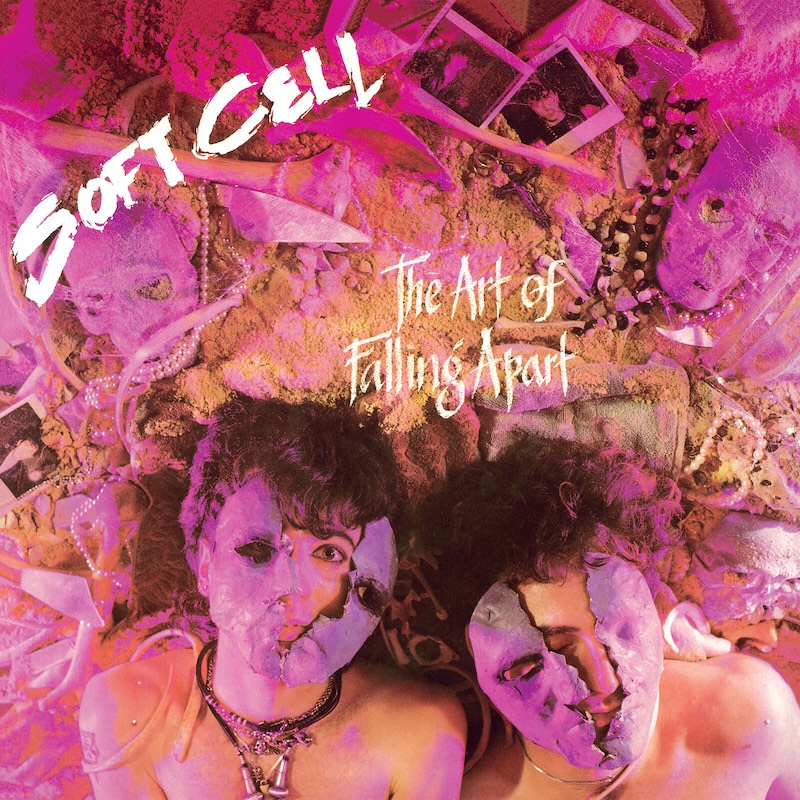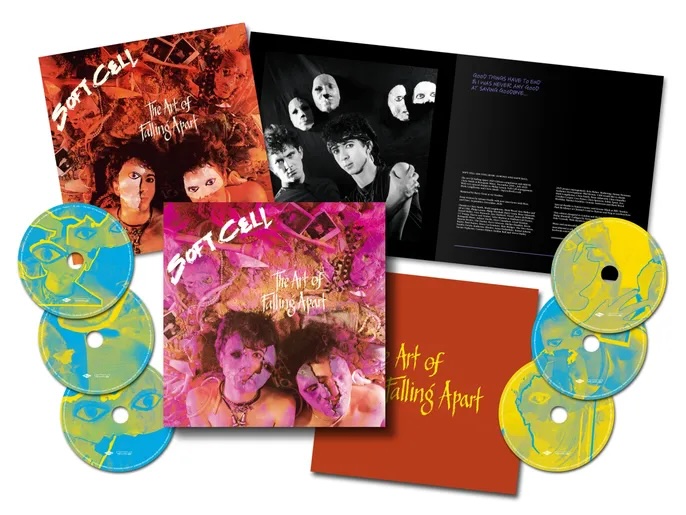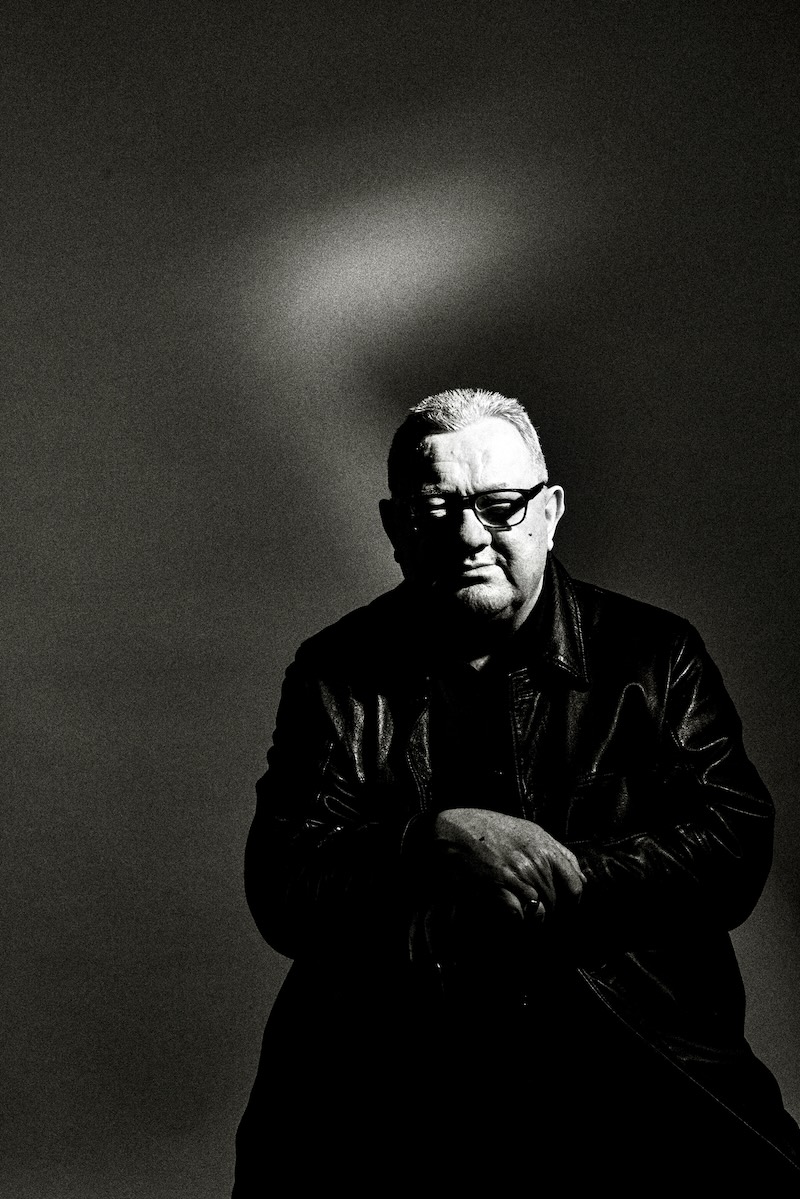Months prior to his premature passing, Dave Ball joined Marc Almond to discuss Soft Cell’s second album The Art of Falling Apart and new music

One of the greatest dark pop records ever made, Soft Cell’s second full album saw Marc Almond and Dave Ball live up to The Art Of Falling Apart’s title. Shortly before his premature passing, Dave joined Marc to discuss the duo’s second full album with Classic Pop. A mixture of fame comedown and gleeful anarchy, here the duo tell us how pulp fiction, drugs, a very different New York and, er, Tiswas contributed to a twisted masterpiece.
When Soft Cell were art students at Leeds Polytechnic, Marc Almond wrote a song in the vein of Ziggy Stardust about a fictional band breaking up. Four years later, when Soft Cell had been informed by their record label Phonogram that they needed to start thinking about a full follow-up to Non-Stop Erotic Cabaret, Dave Ball remembered his bandmate’s seemingly prophetic blast of anarchic mayhem.
“I remember saying to Marc that we had a track from college that would make a brilliant title for a follow-up album,” smiles Ball, bright and jokey at his South London flat. “I told him The Art Of Falling Apart was one of his best song titles. That song is the genius of Marc. My only genius is for remembering a song title he’d probably forgotten about.”
Ironically, Almond has forgotten the track’s genesis again when he’s reminded of its key role in shaping Soft Cell’s future. “It’s such a strong, anthemic song,” he considers. “It wasn’t one that was among the selections for Non-Stop Erotic Cabaret, and I don’t remember it as an early demo. But it was a demo that had found new relevance.”

Accidental Pop Stars
For Ball, the title summarised how Soft Cell were feeling at being unsettled by becoming accidental pop stars. He explains: “We’d had massive success and wanted to destroy it in front of the fans. That’s very Ziggy Stardust. The album started from there, being about a pop band that self-destructs.” Of course, what had begun as a college tribute had become real for Soft Cell, as Almond notes: “In the early days, we hadn’t been through some of the things for me to write and sing The Art Of Falling Apart’s lyrics with experience and conviction.”
As with the rest of the album, Almond certainly sings its title track with conviction. Even by his standards, there’s an intensity to his vocals, matched by Ball’s claustrophobic, grimy music. It’s a record that still leaves Almond with mixed feelings, as he says: “Musically, I think it’s fantastic. But it’s just not a loveable record, as it’s so bleak and dark. Some of the best records aren’t loveable: I think Berlin is Lou Reed’s best album, but do I love it, can I listen to it all the time? I’m not sure.”
Raw Power
Ball views its nihilism as making for their punk record, reasoning: “The Art Of Falling Apart is a punk album in the way that we approached it. It’s a lot rawer than Non-Stop Erotic Cabaret, but it’s also more sophisticated and darker. It’s how we were feeling at that point.”
That Soft Cell were spooked by success is at least in part down to their roots as performance art students. Almond and Ball were outsiders, suddenly at the heart of the mainstream. Many musicians don’t enjoy the promotional treadmill, but for artists who had mixed Tainted Love with the murk and glamour of Non-Stop Erotic Cabaret, it triggered a full-on existential crisis.
“The business side of it all became relentless,” sighs Ball. “We’d give the same answers 50 or 60 times a day in interviews, then perform the same three songs 12 times on TV shows. The darkness of fame came from the boredom of repetition.”
Being on TV literally made Almond sick, as he recalls: “We viewed success differently to a lot of our peers. For us, it wasn’t about wearing party hats or getting thrown into a pool of foam on Tiswas. That actually happened to me, and I found it humiliating. The foam made me ill for a week, as I swallowed a load of soapsuds.”
Of course, there were upsides to fame, as Almond ponders: “It was great to have this huge audience. Making videos, being on Top Of The Pops, recording in New York: that was fantastic. Success was a double-edged sword, but big success was a revenge for all those who had bullied me, or put me down, and I enjoyed that.”
Newfound Treats & Temptations
Ball also enjoyed New York, and being able to expand his synthesizer collection, joking: “I loved being able to afford my first home, having money and travelling, which makes me sound like a Miss World.”
If the darkness was winning out, it resulted in obvious problems, as Ball concedes: “Newfound wealth meant we could afford newfound drugs, like cocaine, to relieve that boredom. I know that’s a cliché, but it’s a cliché for a good reason, because it works for so many bands.”
Almond lists the pressures contributing to him and Ball starting to drift apart, stating: “We became distant from each other through lots of outside forces: record company pressures, media demands and a manager who, at best, I could say was unconventional and didn’t help us in the right direction.”
Almond calls Soft Cell’s then-manager, Some Bizzare boss Stevo, “a destructive force”, adding: “No-one was steering the ship and it ran aground. We were exhausted from three very high-pressured, chaotic years and, yes, we had addictions, too. We felt we had lost ourselves.”
That the duo were able to pour those frustrations and addictions into songs like Forever The Same, Kitchen Sink Drama and Heat would have been a mighty achievement in any circumstances. However, Almond believes it was natural for him and Ball to rally, saying: “During the making of The Art Of Falling Apart, we had a very strong creative connection.
“Dave and I have always been very different people, but creatively we’re like jigsaw pieces that fit together. We fill in the gaps that the other doesn’t do.”

The Art Of Falling Apart super deluxe 6CD boxset
Needing Space
For Ball, it was simply that relentlessness of the promotional treadmill that changed Soft Cell’s relationship, as he reasons: “We wanted our own space, as we saw each other so much professionally. We didn’t want to see each other all the time when we weren’t working, which pushed us apart. When we did drugs, I had my own bunch of people and so did Marc.
“You build your own clique, but we didn’t drift apart as a creative force. It’s how we’ve always been ever since, really; still making records off and on, always being a creative force when we’re on.”
Classic Pop’s writer was only 10 when The Art Of Falling Apart was released, and it opened up a world of otherness within music. It’s a notion that gratifies Almond and Ball, as the latter grins: “T-Rex’s Electric Warrior and The Slider came into my life around that same age you were. They blew my mind, too. Musically, The Art Of Falling Apart is my version of The Slider.”
Almond takes up the theme of messing with impressionable fans’ minds: “We loved the idea that we had this platform of a large audience. As former art students, we loved being subversive, and to be subversive you have to be in the mainstream. We didn’t really think or care whether Phonogram would like it or not. They didn’t. At the time, it was the statement we wanted to make.”
Torch Song
For all its chaos, The Art Of Falling Apart has some great melodies at its core, one reason it’s aged so well 42 years later. Almond recalls: “Success is seductive. We thought we were making pop music of a kind, but we just had more ambition with things we were doing. We thought that, to have a legacy, albums had to be as important as singles, whether that was right or wrong.”
He and Ball have said before that not including the standalone classic No.2 hit Torch on the album was a mistake. For Ball, what he calls “Being stubborn, stupid and conceited, as usual” in Torch’s omission was made worse because that had been an accidental success anyway. As he says: “Torch wasn’t an obvious hit in the first place. We hadn’t intended it to be a big pop song, it’s a song which just happened to be very popular.”
Almond considers It’s A Mug’s Game, the B-side of first single Where The Heart Is, as worthy of the LP, admitting: “Not putting that on the album was probably a mistake, too, as it was hugely popular.”
Instead, the album’s second single Numbers was the clearest sign that Soft Cell were not about to release another Tainted Love. Inspired by John Rechy’s 1967 cult gay novel of the same name, Numbers is what Ball accurately calls: “Messed-up funk. It’s like someone on ketamine trying to make a funk record, or funk if you’re coming up on smack.”
“Numbers was such a dark song to ever be released as a single,” acknowledges Almond. “I don’t really know why it ever was. It was quite out there, certainly not what Phonogram wanted from Soft Cell. Even now, I don’t really like doing Numbers live. It’s just too bleak, as is Baby Doll.”
Dark Delights
Ah yes, Baby Doll, Soft Cell’s cheery tale of the realities of strippers, named after Almond and Ball’s favourite New York strip club. “Baby Doll is one of my favourite Soft Cell songs,” says Ball. “We liked the name of the club, and then we got to know one of its workers. This was information we’d never have come into contact with before, at a time when Marc and I were into finding experiences and making them real. In the early 80s, New York was there for the taking. London had some good clubs but New York had lots more of them. And they were heavier, too.”
The album was far from unrelentingly bleak, as highlighted by Hendrix Medley, their cover of the legendary guitarist’s classics Voodoo Chile, Purple Haze and Hey Joe done as proto-electro. The pair had taken a strain of acid called Purple Haze when Hendrix’s song came on. Considering The Art Of Falling Apart was recorded in New York where the guitarist made his Electric Ladyland album, making Hendrix Medley added to what Almond calls: “The fun part of making that album – a mad studio jam that didn’t have a lot of planning.” Ball adds: “It was a tongue-in-cheek tribute, but we really were both massive Hendrix fans. There’s an irony to an electronic band covering Hendrix, but in my opinion he’s still the greatest rock guitarist.”
Manic Martin
The album’s other song from their college days, goth classic Martin, was also not entirely serious, even if its lengthy manias are incredibly claustrophobic. Ball cites it as typical of the darker books and films inspiring Soft Cell at the time, as Almond reflects: “Martin didn’t fit in with the more obvious pop of Non-Stop Erotic Cabaret, but it worked on the next album.”
Inspired by reading the book which became a George A. Romero cult horror classic, Almond says of the 10-minute chiller: “A story about an alienated psychotic teenager who either thought he was a vampire, or really was a vampire, was part of the Soft Cell world. I’m very happy if Martin is a goth classic, and I love performing it: the galloping electro rhythm and dark, jarring synth sounds are really exciting, especially live.”
As with Non-Stop Erotic Cabaret before, The Art Of Falling Apart has now become a luxurious 6CD set. It actually suits a record which saw Soft Cell become respected as an albums band. Citing Heat as his favourite song – “Hot and humid, with lots of dark, pent-up sexuality” – Almond considers: “Maybe we should do the whole album live at some point, though it’s not easy.”
Ball, meanwhile, is delighted that his and Almond’s plans to become an albums band paid off. “Making The Art Of Falling Apart made good artistic sense for us, and it’s an album we’re still talking about,” he points out. “It’s great that people remember it so much. I guess it is a strange record, but no-one died. That’s always a good sign.”

Dave Ball by Mike Owen
New Music
Talking to Classic Pop months before his passing, Dave Ball also shed some light on Soft Cell’s sixth full LP. The album will be called Danceteria, after the New York nightclub Soft Call frequented while making their first two records. “Marc and I were drawn to the same dark places. We were lucky to go to New York in the early 80s, when clubs like Danceteria were still around.”
The new record isn’t a replica of the sound of Danceteria’s playlists, however, as Ball explained: “New York and the madness that went through it was an influence on our lives in the early 80s, but the new album is very modern sounding.”
Ball had been in a wheelchair since he broke his back in an accident shortly before the release of *Happiness Not Included. He spent seven months in hospital, which has influenced Danceteria. He said: “I had strange recollections when I was in and out of hospital, because I was on morphine. The new songs are a digital reflection of the sounds in my head from that time. In parallel, it’s about the times me and Marc got up to in the 80s. It’s looking backwards and forwards, the creative times we’ve had and how we feel about life now. I live in a fourth floor flat today, but I was on the 24th floor of the same building when I wrote most of these songs. Overlooking central London, for my first high-rise album, felt very futuristic.”
The release date of the brand new Soft Cell album Danceteria is to be announced.
To order The Art Of Falling Apart super deluxe 6CD boxset, double LP or double CD, click here.
Featured image credit: Peter Ashworth
Subscribe to Classic Pop magazine here
Classic Pop may earn commission from the links on this page, but we only feature products we think you will enjoy.


